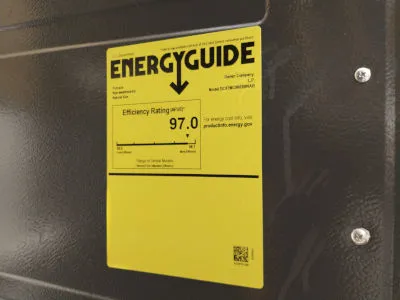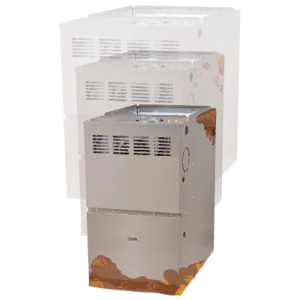What is AFUE?
If you’re shopping for a new furnace, then you’ve probably seen the yellow energy guide stickers or have at least heard the term AFUE get thrown around. If you don’t know what that phrase means or know how it can practically apply to you, then it might make the process more confusing than it needs to be.
HVAC is full of lots of complicated terms. Even the name of our industry is an acronym. It doesn’t need to be confusing, though.

In this post, we’ll explain what AFUE stands for, how it’s calculated, and how you can think about it in a practical sense.
To start off, AFUE stands for Annual Fuel Utilization Efficiency.
Why is AFUE Important?
It may seem like HVAC equipment has ratings just to have ratings, but they all actually mean something. The AFUE of a furnace is a way of calculating how much of the fuel it uses gets turned into heat for your home. If a furnace has a higher AFUE, then more of its fuel becomes heat that enters your home.
Keep in mind, AFUE just measures the efficiency of the heating unit itself. Heat can still escape through chimneys, unsealed or uninsulated ducts, or out open doors. This escaped heat will not factor into the AFUE rating.
How is AFUE Calculated?
Whether your furnace uses oil or gas, we can calculate the AFUE the same way.
(Amount of Heat Produced in BTUs/Amount of Fuel Used in BTUs) x 100
This results in a percentage of how much fuel gets turned into usable heat.
To visualize this, imagine you have a gallon of milk and an empty gallon container. We want to transfer the milk into the empty the container. If the process is 98% effective, then 98% of the milk makes into the other container while 2% spills out the side or leaks out.
The gallon of milk is your gas or oil supply, and the empty container is your home. When we pour the milk, that’s like your furnace turning gas into heat.
So, if a furnace is 98% effective, then 98% of the fuel it uses turns into heat which enters your home. 2% of the fuel gets turned into wasted or lost energy that either burns off early or leaks out before entering your home.
What is a Good AFUE?
The Department of Energy started creating standards for efficiency in 1975. The DOE set the current standard in 2015. Today, the minimum AFUE you will see on the market is 80%. Anything below that is low-efficiency and out of date.
Mid-Efficiency
Furnace’s with AFUE between 90% and 93% are in the mid-efficiency range. This is what you will find in most homes in America in 2022.

High-Efficiency
A high-efficiency furnace has an AFUE between 94% and 98.5%. 98.5% is the highest AFUE available in 2022. If you want to have the most energy efficient furnace possible, then this is the range you will want to shop in.
How Does AFUE Affect You?
A furnace’s AFUE isn’t just an arbitrary measurement. It can impact your life in several ways. These are:
- Energy Cost
- Furnace Lifetime
- Environmental Impact
Fuel Cost
The most obvious way that a furnace’s AFUE can affect you is by how much you will spend on utilities to operate it. Whether oil or gas, you will need to pay for the fuel that furnace uses. If a furnace is more efficient, then it will use less fuel to generate the same amount of heat as a less efficient model. This means that you will spend less on gas or oil to operate a high-efficiency furnace.
Future Proofing Your Furnace
Furnaces lose efficiency every year that they operate. This is just part of the natural process of wear and tear. A furnace has a lot of moving parts, and it creates heat through combustion so there will also be some amount of wearing down.
A furnace that was 80% efficient ten years ago cannot offer the same level of efficiency today.
If you invest in a high-efficiency furnace, then it will be more efficient for longer as it is starting from a higher rating. While you cannot stop the natural breakdown of parts, you can save yourself from your HVAC system dipping into the low-efficiency range as it ages.

Reducing Environmental Impact
Naturally, a furnace that is more efficient is going to be better for the environment. It creates fewer emissions that can escape through the flue or exhaust by turning that fuel into heat. It also will need to draw less fuel or oil to generate heat, conserving natural resources.
If environmental impact is important to you, then the AFUE is an important statistic to be familiar with.
What Else to Look For When Furnace Shopping?
AFUE is not the only statistic that can affect a furnaces efficiency or performance. There are a few other factors that you should consider. These are:
- Fuel Type
- Variable Speed Furnace
- Warranty
Fuel Type
If you are not using an all-electric furnace, your furnace will need a fuel source. This is natural gas or oil. Natural gas furnaces are more efficient than oil furnaces mostly and each gets supplied with fuel through different methods.
Variable Speed
Furnaces that have a variable speed run more efficiently than a standard furnace. A typical furnace has two settings: on or off. If a furnace has a variable speed setting, it can change the rate at which it blows heat on a sliding scale. It works like a dimmer switch for a light. If you only need a little heat, it only blows a reduced amount of heat.
Warranty and Protection
Having a strong warranty can impact the cost of owning your furnace over the long term. Furnaces can last up to 20 years, and you want a warranty that can keep your furnace running for its full lifetime. Regular maintenance can reduce the chance of equipment failure, but the chance of breakdown is never 0%. Having a warranty that can cover parts or labor for a long period can reduce or negate the cost of any future repairs.
Who Are Advantage Heating and Air Conditioning?
We are your local HVAC Experts out of Salem, Oregon. We hope that this post gave you the information you need to know about AFUE. If you have other questions about HVAC systems, check out our other blogs. To learn more about who we are and how we can help you, visit our website and follow us on social media – we’re here when you need us!







